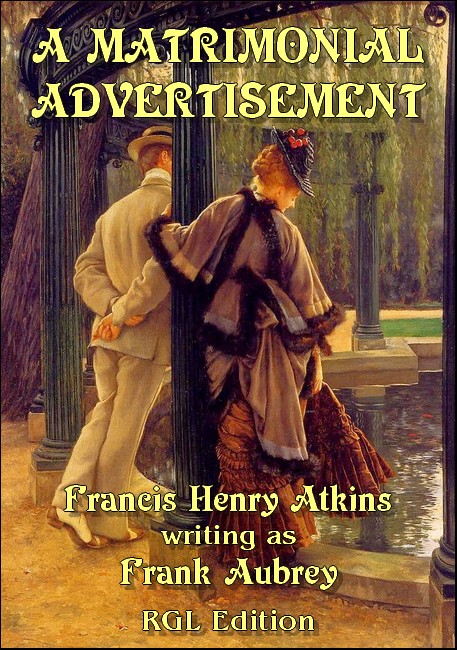
RGL e-Book Cover©
Based on a painting by James Jacques Joseph Tissot (1836-1902)
Roy Glashan's Library
Non sibi sed omnibus
Go to Home Page
This work is out of copyright in countries with a copyright
period of 70 years or less, after the year of the author's death.
If it is under copyright in your country of residence,
do not download or redistribute this file.
Original content added by RGL (e.g., introductions, notes,
RGL covers) is proprietary and protected by copyright.

RGL e-Book Cover©
Based on a painting by James Jacques Joseph Tissot (1836-1902)

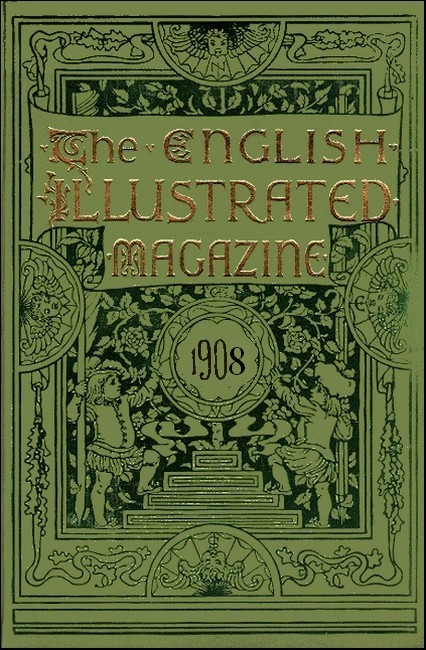
The English Illustrated Magazine, 1908
with "A Matrimonial Advertisement"
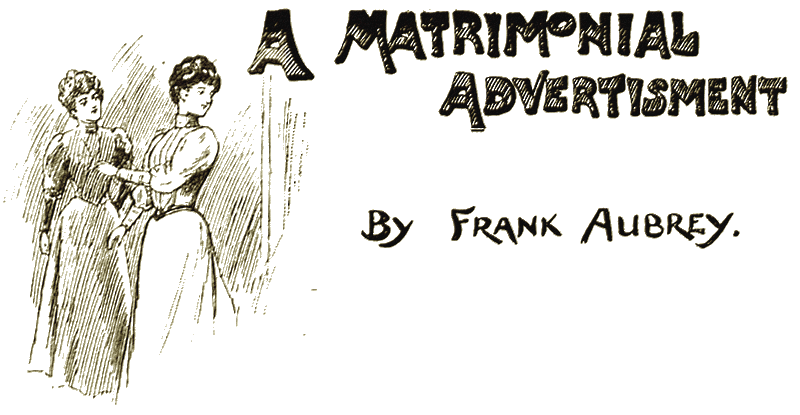
"WELL, certainly, one might have some fun out of it, if nothing else," said Myra Vernon, as she stood opposite a large mirror and complacently surveyed the comely face and figure she saw reflected in it. She was trying on a new dress that had been brought for that purpose by Miss Lizzie Vane, dressmaker and milliner and humble friend of the handsome, dashing Myra. "But you wouldn't expect me to regard it seriously, surely?"
"Why not. Miss Myra?" Lizzie asked, the while she busied herself arranging the folds of the gown. "I know all about the matter. The gentleman who inserts the advertisement is, I am told, young and good-looking, has given excellent references, has a large fortune, and will settle a handsome sum upon the one he marries. If you like to send a reply to his advertisement, I can arrange that it shall be the only one he will receive for the present, and so give you every chance, you know."
Myra gave a ringing laugh. "How is it you are able to do that, and to know so much about it? Are you looking out for something of the sort yourself?"
"Oh no! You know I am engaged to—to—"
"To the 'drapery crapery' young man," Myra broke in. "Yes, I know. The one employed at your place in the mourning department. But it's not through him you know about this, is it?"
"No, Miss Myra. You remember I used to be a clerk at the offices of Mr. Hyemann, the matrimonial agent, before I took to the dressmaking business. He sent for me yesterday, specially, to tell me about this; and he will do what I have said. All you have to do is to sign this note agreeing to pay him a commission upon the amount settled on you, in case you marry the gentleman."
"In case I marry him," returned Myra. "Oh, well, there's very little likelihood of that; so there's no harm in signing any number of 'notes' upon that condition. Certainly it would be a good joke," she continued, musingly. "You say you will write the necessary letters for me, to my dictation, and they can be signed in another name at first?"
"Yes; mine if you like."
"N—no. I think not. Better keep to the same initials, M.V. I have it! We will use the name of Myrtle Vining. You know her. Yes, it will be a capital little joke."
And so the two plotters arranged matters between them But Miss Lizzie had not thought it necessary to mention that her interest in inducing Myra to enter into the scheme lay in the fact that old Hyemann had promised her £200 out of what he was to receive, if it "came off."
"With that," thought Lizzie, "Dick and I can get married, and I can go into the dressmaking business for myself"; Dick being the "drapery crapery" young man aforesaid.
Myra was staying at the time for three or four weeks with some friends in town; but her home was with a maiden aunt, Miss Matilda Vernon, who lived at Riversley, a small town on the Thames, a few miles away from London.
Now Mr. Bertram Challoner, the very eligible bachelor who had become a client of Mr. Hyemann, had come very unexpectedly into a fortune while living in a distant colony, and had come back to England to enjoy it and to look for a wife. But, having been abroad since he was a boy, and having neither relatives nor friends to go to, he had decided to "try his luck" with a matrimonial agent. "It can do no harm," he had thought; "and it may lead to something." So he looked in the papers, saw Mr. Hyemann's advertisement, called upon that gentleman at his office, and they very soon made an arrangement. It was, amongst other things, agreed that Bertram's real name should be kept back for a time. "I will call myself C. B.—initials reversed, you see—say Charles Bailey," he had said; "and cannot one of your clerks do the writing for me, until I find matters taking a serious shape? Meantime, here is the address of my solicitors; you can refer to them if you please, and they will confirm what I have told you about myself."
All these preliminaries being settled, Mr. Bertram Challoner set himself to work to hunt out some old friends, and, in particular, one Bob Whitney, a former schoolfellow, by way of passing the time while waiting replies to the advertisement Mr. Hyemann was going to insert for him.
After some trouble he discovered that Bob and his widowed mother were living in a pretty little country house near Riversley, and thither he went once or twice to visit them. He was received with open arms, and he and Bob became great friends again; but he said nothing of his matrimonial schemes, fearing to incur the other's ridicule.
One day he received, through Mr. Hyemann, a dainty, scented, pink note, signed M. V. He duly answered it through the obliging agent's clerk, after which there came another, signed Myrtle Vining. A few more letters were exchanged, and then, finally, in reply to one from him pressing for a meeting, he received the following epistle:—
Since you desire so much to see me, I write now to say that we can meet if you like at a regatta that will take place on the 1st June at Riversley—not far from town. If you write to the secretary of the committee, you can get, for 10s. 6d., a ticket that will admit you to 'Fairlawn,' where the band will be stationed. As a token, wear some blue cornflowers in your coat. You can get some by ordering them beforehand at Covent Garden, and I will do the same. At this time of the year they will be so uncommon there can scarcely be any mistake.
Myrtle Vining.
Bertram read this note with much surprise. For one thing, the
date given was fully three weeks off, and it seemed a long time
to wait; for another, the place named was Riversley, where lived
his friend Bob Whitney. This put him in a bit of a difficulty,
for, if he mentioned to Bob that he wanted to go to the regatta,
Bob would be pretty sure to offer to accompany him; while, if he
went without saying anything about it, Bob might meet him there,
and then it would look strange. However, on mentioning it
tentatively, Bob Whitney said, "Ah yes! First of
June—regatta day at our place. I never go, as a rule, and
this year don't intend to, unless you want me to go with you." So
Bertram was left free to go alone as he wished.
THE little up-river town of Riversley is a very gay place on the occasion of its annual regatta; and this year was no exception to the rule. The day was gloriously fine, and numbers of people in holiday attire were to be seen making their way towards the banks of the Thames, where there was the usual display of flags, and gaily decorated house-boats. The grounds of "Fairlawn," the riverside residence of a local magnate, were lent by its owners to the regatta committee and their subscribers, and upon the spacious, well-kept lawn, or wandering beneath the belts of fine old trees and amongst the shrubs and flower beds, was a brilliant assemblage in the brightest of summer costumes. A band discoursed sweet music at intervals; and the continual popping of corks kept up a running fire by way of accompaniment.
Bertram Challoner had arrived early by train from town. In irreproachable frock-coat, fresh from Poole's, and a new "Lincoln and Bennett" that shone as though it had just been oiled, he mingled with the throng, looking keenly about for a sight of a blue cornflower, but seeing none. There were many men there also in frock-coats and top hats, so he felt fairly at his ease, though the majority of those of his own sex present were in flannels and blazers. Concealed in his hat was a "button-hole," neatly made up of maidenhair fern, a small white rosebud, and two or three blue cornflowers; but he had bashfully decided to reconnoitre a little before displaying this token in his coat.
Presently it occurred to him that the fair unknown would be more likely to seek him in one of the winding paths under the trees, away from the crowd, where there were seats to be found in retired shady nooks, so he left the river front and wandered off by himself.
The idea seemed to be a good one, for he had not long taken up a post of observation on a seat at the junction of four paths, from which he could keep a look-out in several directions, when he espied a pretty girl in a charming white dress tripping towards him, and unmistakably wearing two or three blue cornflowers amongst other flowers in the front of her dress.
Now that the fateful moment had arrived, Bertram felt himself getting very red in the face; but repressing his emotions as well as he could, he rose and advanced to meet her, his own "token" in his coat, and his most fascinating smile upon his lips.
"We meet then, at last, my fair correspondent," he said. "I began to think you cruel for delaying so long. Believe me, if you only knew the impatience with which I have been waiting for you—"
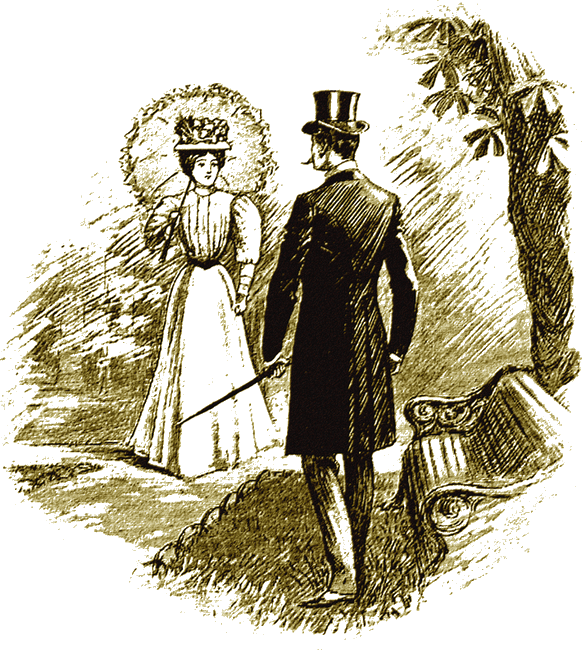
"We meet then, at last, my fair correspondent."
Here he pulled up abruptly, dismayed at the very evident signs of astonishment and anger he read in the face of the young lady.
"I think there must be some mistake, sir," she replied, coldly. "I have never seen you before. I do not know you; and I must ask you to be good enough to allow me to pass."
"Not know me!" exclaimed Bertram. "Why, no—of course not—how should you? But," confidentially, and stepping nearer to her, "you know you have written to me, you—you—answered my advertisement, you know." Then, seeing that she looked only the more astonished, he stammered out, "The matrimonial advertisement—"
"Sir!" she cried out, indignantly. "I answer a matrimonial advertisement! How dare you insult me by such a suggestion! Let me pass at once, or I will call out and summon my friends—my father—and—and my brother—and—and my cousin—are close by—over there!" And she waved her hand menacingly in the direction of the lawn, while she swept past him, Bertram mumbling humble apologies about "some strange mistake."
"My stars!" he murmured, sinking back on to the seat from which he had risen so eagerly but a minute before, "a mistake! Great Jupiter! And suppose she goes and makes a fuss and brings her relations round—her father—and— brother—and, and—cousin, I think she said! It would be anything but pleasant for me; and would put an end to my chances of meeting with the right party!" And with another long-drawn and very forcible exclamation, he lapsed into silence and took out a cigar by way of consolation.
But he kept a sharp outlook on all sides for possible "fathers" and "brothers," and presently he caught sight of another young lady coming towards him, and his spirits rose when he noticed that she had a bunch of blue cornflowers displayed upon the bosom of a dainty costume of pale pink and white. "She's prettier than the other one," was his comment, "and it must be all right this time. There can't possibly be two girls wearing this particular flower, at this season, by mere chance.
No! It must be all right this time," and he rose and went to meet her, hat in hand, and smiling confidentially as she approached.
But alas! The result was more disastrous than before, for this young lady blazed up with such unexpected anger that he felt inclined to climb the nearest tree to place himself out of her reach. And she threatened to call her "three brothers," who were also, as it deemed, "over there." And she disappeared down the path, with a look of pain upon her face that sorely distressed the bewildered Bertram, who sank again, limp and almost gasping, into the friendly seat.
"Great Scott!" he exclaimed, "another mistake! Why, how can it be possible? Threatened to call more of those terrible brothers, too—from—over there. That makes four brothers I'm threatened with, besides a father, and a—a—cousin, I think it was. Well, thank goodness, she's gone in the opposite. direction; she can't get back to 'over there' for a few minutes, anyhow, and meantime—I shall clear out."
He took out another cigar to console himself with, for he had thrown the other away as soon as he perceived the "Number two" young lady, as he called her, coming towards him—took out the blue "token" from his coat, and replaced it in his hat, then walked off the path, moodily, beneath the trees and clumps of shrubs.
Wandering about thus, and undecided what to do, he found himself, after a time, close to the lawn again, but concealed from it by rhododendron bushes; and he stood gloomily listening to the band, and watching various people near at hand, as they walked or stood about, or sat upon chairs, in groups.
Heartily he wished he had never come there upon what seemed such a fool's errand, and he was about to turn away and make his way out through the grounds, when he caught sight of something that once more raised his hopes, and caused him momentarily to forget his previous disappointments. This "something" was an extremely handsome young lady in a choice gown of lemon-coloured silk, and wearing blue cornflowers, not merely in a small bouquet in the front of her dress, as the others had, but in her hat, upon each shoulder, and fastened in her hair as well.
"Now this looks as if it must be all right," Bertram said to himself, cheerily. "There cannot, surely, be any mistake this time. No woman would make such a display of a most uncommon flower without an object. Doubtless something detained her by accident, and she will soon find some excuse for leaving those people she is with and going off alone towards the house by one of these paths. Well! I like her just as well as either of the others; even better, I think; more style about her. If she goes off as I expect, I shall take it as settling the matter, and go round to meet her."
And sure enough, to his great satisfaction, she shortly afterwards left the group she had been chatting with, and entering one of the walks, strolled off alone. Looking on this as conclusive, Bertram turned away also, and got round through the trees so as to intercept her. Once more the bow, the smile, and the preliminary observation:—
"We meet at last, fair lady!"
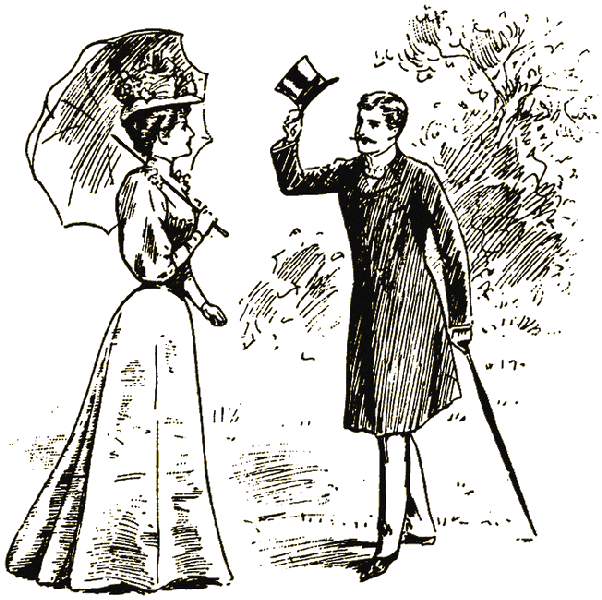
"We meet at last, fair lady!"
But the result was not encouraging. The lady addressed stood still and stared, and then looked alarmed.
"What do you want, sir?" she asked, "I—I—do not remember to have seen you before."
"You haven't, of course," assented Bertram, blandly, "but you will no doubt understand when you see this"; and he took the "button-hole" with its blue cornflowers out of his hat and offered it to her.
Still she did not seem to comprehend and only looked more frightened.
Bertram began to grow alarmed too, fearing there was yet another mistake.
"I—I—do hope," he stuttered, desperately, "I do hope there is no mistake. I thought I was to meet you here to-day, and I have been waiting and looking everywhere for you I have a letter here—somewhere—signed Myrtle—"
"That is my name, sir," the lady interrupted, "but—"
"Myrtle Vining," Bertram put in.
"Yes, sir, Myrtle Vining, Mrs. Myrtle Vining—" with emphasis on the Mrs.—"but if you dare to say I have made any assignation, or that you have any letter from me, I will call my husband and tell him, and he—Where is the letter?" she broke off, stamping her foot. "Show it to me at once, if you have it. If anyone has been playing a trick upon you, of course it might be some extenuation, but, otherwise—"
But Bertram could not find the letter! He hunted for it in vain; he had left it in the pocket of his other coat!
And Mrs. Myrtle Vining, as she declared herself to be, dashed away, sobbing and almost in hysterics, leaving the unfortunate Bertram more bewildered, more limp, and more astonished than ever he had been before.
"Heavens above us!" he whispered, unable to find voice. "Another 'mistake'! Phew! Yet the same name, too! What on earth can it mean? Her husband, too! A father, and three—no four—four brothers, and a cousin—these were not enough, but a husband must be added! I shall have a whole company of them round me directly, howling and thirsting for my blood. Great Scott! I must get away from this. I wonder which is the way out by the back door!" Muttering thus, and taking the opposite direction to the river, he started off, tearing the poor "button-hole" savagely to pieces on the way.
BERTRAM CHALLONER had gone some distance, and was approaching what was evidently a sort of side entrance to the grounds, when whom should he see, coming towards him, but Bob Whitney!
"Hulloa!" said Bob, "Why, where are you off to? Going? Tired of it already?"
"Yes," returned Bertram, "I'm off. Had quite enough of it."
"Ah, yes," Bob agreed. "Not much fun in it, is there? I'm not going to stay either. I'm only going to see whether I can find my cousin Myra. She's there somewhere. We have some friends come down unexpectedly, and they want particularly to see her; so my mother sent me to fetch her. I shan't be long—shall be back very shortly—and then, if you've nothing to do, you may as well come back with me and have some tea. Will you wait here for me; or will you come back to the lawn with me?"
"N—no—no," Bertram answered hastily, "I won't go back with you; but I will wait for you if you like."
"All right, I won't be long "; and Bob strode off and left him.
There was a seat near, and Bertram sat wearily down on it, took out another cigar, lighted it, and pondered. Suddenly he sprang up.
"Great Scott! I never thought of that! Why, this cousin Myra may be one of those three girls! Jupiter! I couldn't stand that! I'd best keep a good look out and make sure."
There was a bend in the walk just there, and at the bend a large clump or thicket of evergreen shrubs. He got into the centre of these and peeped through the leaves along the path. "Now," he said to himself, "I can see from here; and if it should be one of those three, I can let them pass and they will go on and not see me; and if it isn't, well, then I can just pop back to the seat before they come up."
After waiting for a short time, he saw his friend returning with a handsome-looking girl on his arm. She was dressed in a light blue boating costume and sailor hat, and looked, Bertram thought, decidedly "taking." "Not quite so sweet-looking as 'No. 2,'" he decided, "but more dash and go in her, I guess. Dear me, what a fool I've been, messing about, wasting my time sticking about alone, and only getting into embarrassing situations, when, all the while, here was Bob Whitney able to introduce me to jolly-looking girls like this."
He stepped back quietly to the seat, and a minute later was introduced to the mischievous Myra. Soon he was talking away merrily with her, little suspecting that she was the cause of all the troubles and perplexities that had beset him that day.

"A minute later was introduced.
For when, that morning, her three friends, Alice Powell, Violet Merton, and Myrtle Vining—the last a young lady but recently wedded—had called for her to accompany them to the regatta, Myra had produced a large bunch of blue cornflowers, and had insisted upon distributing them all amongst the three, saving that they were of no use to her, for, the dress she was wearing being blue, they would not "go well" with it. After her victims' several encounters with Bertram—which also had been contrived by her, she having despatched each in turn upon trifling errands to the "house"—they had come back and told her the tale, with which she had pretended to sympathise, while inwardly laughing at the success of her scheme. To avoid awkward explanations, however, she had counselled each one to keep the matter quiet for the time, and not make a fuss about it.
Bertram passed the evening at Bob Whitney's house, and became decidedly smitten with Myra's dashing manners and ways. For one thing, no doubt, he was in the mood to seek "consolation" for the rebuffs he had experienced and his disappointed hopes that day. It was arranged, before he left, that he would go to Eastbourne for a month, to meet Bob and his mother and some friends—including the lively Myra.
Before that month was ended he was engaged to Myra, and the wedding had been fixed to take place some three weeks later.
During this time nothing had been said on either side about the advertisement episode. Bertram had not mentioned it even to Bob Whitney. It was not only that he was a little ashamed to; but also that he felt very sore about it. He felt he had been hoaxed, and nursed angry feelings towards the perpetrator of the hoax. He had been made to appear not only foolish, but worse, in the eyes of the three ladies he had inadvertently annoyed; and, in particular, he often recalled the tearful,reproachful look with which the second of the three had regarded him. So often did this thought recur that he quietly resolved that after he had got back to town, he would somehow seek out the young lady and so explain matters as to set himself right in her eyes. He had a clue to go by in that he knew the name of one of the three, and, in a small place like Riversley, he thought, there should not be much difficulty in finding out where she lived.
As for Myra, she was very well pleased with her "capture," as cousin Bob irreverently called it. Bertram had agreed with her guardians to settle £25,000 upon her; and so the dream and hope of her life was in a fair way of being fulfilled; she would marry well.
One lovely day in July there was another little fête at Riversley; this time a private one, given by Myra's aunt, Miss Matilda Vernon, at her pretty villa, "Sunnybank;" and it was to celebrate her niece's engagement and approaching marriage. On this occasion Bertram Challoner was to be presented to the friends of his fiance, and once more, accordingly, he made his way thither. He reached Miss Vernon's house, and, after receiving a kindly greeting from the old lady, was directed to seek for Myra amongst the guests assembled on the lawn.
But before lie could find her he had to pass a group of four persons, three ladies and a gentleman, and they happened to be—Alice Powell, Violet Merton, and Mrs. Myrtle Vining and her husband! And at his approach the three ladies recognised him as the man who had insulted them on the day of the regatta. "George!" cried Mrs. Vining to her husband, "there's that horrid man whoso insulted me at the regatta, and had the impertinence to say he had a letter from me!" "George" turned wrathfully round, and at the same moment Alice Powell exclaimed, "And he insulted me too." "And me too," came in quieter tones from the gentle Violet, while her sweet face looked at Bertram in surprise, and with mild reproach.
But the latter did not hesitate; he saw before him the opportunity he had long sought to put himself right in the eyes of his accusers, and he drew forth the letter, and, presenting it to the astonished gaze of Vining and his wife, said, "If this is not your writing perhaps you can tell me whose it is. I may look rather foolish over this matter, but at least, if you see that I have been hoaxed, you will, I trust, exonerate me as a victim, rather than think me the caddish bore I must have appeared."
Myrtle Vining took the letter and looked at it. "Yes," she said, "I know the writing. It is little Lizzie Vane's—Myra's dressmaker friend. And now I think of it, of course it was Myra who persisted in decorating me with those cornflowers that this gentleman seemed to lay such stress upon!"
"Yes," chimed in the other two girls, "and it was Myra who pressed those flowers on us too."
At that moment Myra came up, and all turned to her for an "explanation;" and it may be imagined there was a scene. Myra fainted, and was carried off to her room. When she came to she went off again in hysterics; and the garden party hastily broke up in confusion.
.
The next day Bob Whitney brought a note to Bertram from Myra, in which, in a fit of temper, she broke off the engagement; owing, as she declared, to the unkind comments Bertram had made upon her conduct.
"Not that I think it's seriously meant," said Bob. "Myra is a sensible person—and so is her aunt—and I think they will both see things in a different light in a few days."
"Perhaps so, Bob," Challoner replied, drily, "but, in the meantime, she has given me my liberty, and I accept it. I don't so much mind her making me look such a fool, but I don't think she had any right to victimise those three ladies—her own friends."
Two months after the paper contained the announcement of the marriage of Bertram Challoner to Violet Merton. And thus it came about that Myra's little joke not only lost her a rich husband, but the £25,000 he was going to settle on her. Mr. Hyemann, too, has dolefully to lament the loss of his commission, which he had looked upon as already earned; and Miss Lizzie Vane is still unwed, for want of the little sum she had counted upon to start housekeeping with.
Roy Glashan's Library
Non sibi sed omnibus
Go to Home Page
This work is out of copyright in countries with a copyright
period of 70 years or less, after the year of the author's death.
If it is under copyright in your country of residence,
do not download or redistribute this file.
Original content added by RGL (e.g., introductions, notes,
RGL covers) is proprietary and protected by copyright.